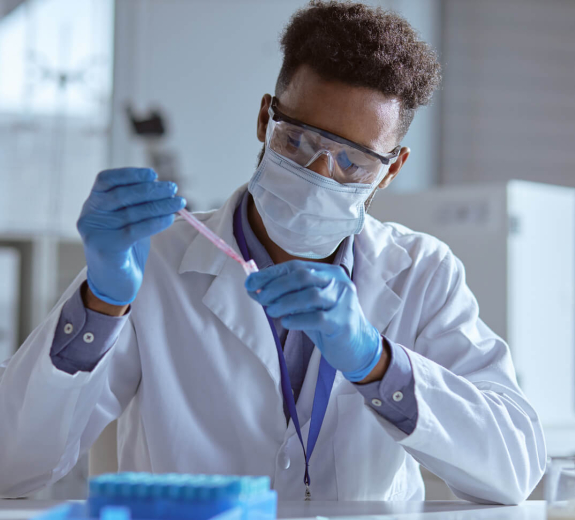
“Cure Diabetes, That’s The Dream”: Inside One Scientist’s Quest to End T1D
Before BRI Lab Aide Noah Biru had degrees in engineering and biochemistry — and was headed to Yale to pursue a PhD in immunology — he was a little kid who wanted to help his mom.
“I was interested in immunology before I even knew what an immunologist was,” Noah says. “When I was really young, my mom was diagnosed with type 1 diabetes. Just seeing her having to manage her type 1 and struggle with that, I wanted to become a doctor and find a cure.”
As Noah grew up, he strayed from that path, deciding to follow in his parents’ footsteps and become an engineer. Just before starting college, he received his own type 1 diabetes (T1D) diagnosis. He adjusted to college life and living with T1D. He ultimately earned a degree in electrical engineering and moved from Texas to Seattle for an engineering job.
“In that role, I was working with really smart people and I was being challenged, but I really wanted to do work that was more fulfilling,” Noah says.
He left that job after a few years and thought critically about what was important to him. That ultimately led him to BRI, where he’s part of a new generation of scientists powering our work and helping our team make new advances.
“I thought about seeing my mom struggle with type 1 and also living with it — and I wanted to jump in, become a scientist, and help find a cure,” he says. “Leaving engineering was a leap of faith, but my family could tell I was really passionate about it and they were one hundred percent on board.”
Launching a new career in science
In 2017, Noah started his second undergraduate degree, this time in biochemistry, at North Seattle College. Thanks to his teachers and mentors, he was soon mapping out his first T1D study, examining if it would be possible to manufacture insulin in oyster mushrooms and create a less expensive way to make the T1D therapy. Their study took the first steps toward using this approach, but there are many more questions to answer before applying this research.
“A lot of us had never held a pipette before, so to go from that to inserting this plasmid that contains the human insulin gene into oyster mushrooms was really exciting and really challenging,” Noah says.
In 2019, he landed a summer internship at BRI, working under Jessica Hamerman, PhD.
“These internships let students experience biomedical research first hand to see if they would be interested in research as a career,” Dr. Hamerman says. “It’s really fun having them in the lab and giving them their first experience doing research outside of a class. It also gives valuable mentoring and teaching experience to scientists in our labs.”
Noah was excited to get hands-on experience working in an immunology lab.
“Everyone in the lab was so welcoming,” Noah says. “One of the coolest things about BRI is how collaborative everyone is within the lab and between labs.”
At the end of that summer, Dr. Hamerman invited Noah to stay on full-time as a lab aide. Despite the crazy schedule that would require — working around classes and coming in on weekends — he said yes.
“I jumped at that opportunity to do lab work and just learn more about being an immunologist,” he says.
Understanding the immune system
Since then, Noah has worked with various BRI scientists, helping answer questions about different autoimmune diseases and the immune system. One of his favorites has been looking at the role of a specific type of antibody in lupus, with the goal of better understanding how specific immune responses impact symptoms and severity of disease.
“Two people with lupus could have very different symptoms,” Noah says. “This is way down the road, but learning more about how these mechanisms impact the course of disease could one day help inform more targeted therapies.”
In March 2021, Noah completed his bachelor’s degree in biochemistry. In April 2021, he accepted an offer to pursue his PhD at Yale.
His experiences at BRI have helped him build a strong foundation in research and put him on a path to make discoveries of his own. It's been a long road and he’s got several years to go — but knowing that the positive impact this work can have gives Noah the fulfillment he was missing and the motivation he needs to keep going.
“BRI has opened my eyes to just how connected the immune system is,” Noah says. “In my PhD, I’m interested in studying autoimmunity broadly, and how and why autoimmune diseases develop and persist. And I’ll always have an interest in type 1 diabetes — we’re going to cure diabetes, that’s the dream.”
Immuno-what? Hear the latest from BRI
Keep up to date on our latest research, new clinical trials and exciting publications.


